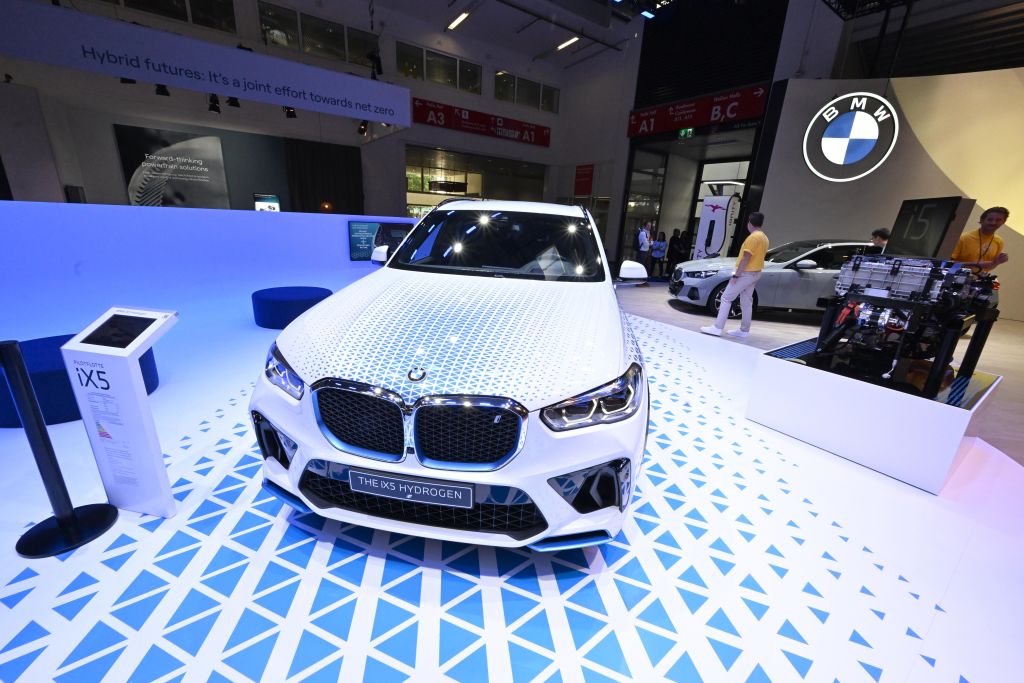BMW (BMWYY) believes the future of electric vehicles is not all about batteries; it should also include hydrogen fuel cells, a promising clean energy solution that has struggled to find commercial success. Earlier this month, the German carmaker announced a partnership with Toyota to build a consumer hydrogen fuel-cell vehicle by 2028. While it’s not the first time BMW has worked on hydrogen technology (it’s actually been developing it since the 1970s), the Toyota partnership, announced ahead of BMW’s series of events at Climate Week in New York last month, helped bolster a lively discussion around the challenges facing widespread adoption of hydrogen fuel cells, most importantly a lack of hydrogen plants and fueling stations across the country.
In the U.S., BMW has been running a small fleet of test iX5 SUVs powered by hydrogen fuel cells for the last few years, racking up around 600,000 km (nearly 375,000 miles) of on-the-road experience, according to the company.
“BMW continually follows a technology-openness approach and sees hydrogen as the missing piece for completing the electric mobility puzzle, where battery electric drive systems are not an optimal solution,” Alexander Bilgeri, BMW’s vice president of corporate communications, human resources, production, purchasing and sustainability, said at one of the BMW events at this year’s Climate Week.
BMW is looking to offer buyers a range of choices for alternative powertrains. It has designed the Neue Klasse vehicles, which will be built at the company’s plant in San Luis Potosí, Mexico, to be able to have either a battery or hydrogen fuel cell powertrain. “We make the hydrogen cells fit into the battery design space,” Guldner said.
While BMW won’t be the first to market with a hydrogen fuel cell vehicle (Toyota’s Mirai takes that accolade), it is the first luxury carmaker to do so. Hyundai offers a hydrogen fuel-cell NEXO SUV that’s been in production since 2018. Honda is offering a hydrogen-powered CR-V for 2025. Nikola, an electric truck startup, is in the early stages of manufacturing a commercial semi-truck powered by hydrogen fuel cells.
Hydrogen fuel cells’ infrastructure problem
Fuel cell electric vehicles, also known as FCEVs, generate electricity via a chemical reaction between hydrogen and oxygen that takes place in a fuel cell, and the electricity powers a vehicle’s electric motor. Excess energy is stored in a small battery. Water is the only emission, so it’s perfectly clean.
FCEVs don’t have the “charging anxiety” problem of battery EVs. They are fueled similarly to traditional gas cars. Consumers pull up to a pump, swipe their credit card, fill their tank with hydrogen (rather than gas or diesel), which only takes a few minutes, and continue on their way. Hydrogen is much more efficient than gasoline, and the FCEVs on the market currently have more than 300 miles of EPA-rated range.
Yet, sourcing affordable and clean hydrogen and a lack of fueling stations have prevented the technology from taking off. Most hydrogen today is known as grey, black or brown because it is produced using fossil fuels. Green or clean hydrogen is made from renewable sources. Hydrogen vehicles are currently only sold in California, where there are very limited fueling stations, mostly in the southern parts of the state.
Most of the infrastructure is still in its very nascent stages (and crumbling), and the current price (at the pump) for hydrogen fuel (measured in kilograms, which is the energy equivalent to a gallon of gas) is around $20 to $30 per kilogram.
At last month’s Climate Week events, BMW brought together academic and corporate experts to discuss these hurdles and map a path forward for the technology. Their plan hinges on “hydrogen hubs” that are slowly being built out to support commercial trucking. Once those hubs are up and running, light-duty and consumer vehicles can simply tag onto the systems.
Yet, experts like Jason Munster, the founder of the hydrogen advising firm CleanEpic, and Lewis Fulton, the director of the Energy Futures program at the University of California, Davis, noted that, until hydrogen fuel cell trucking infrastructure comes online, consumer fuel cell vehicles will struggle to gain market share. According to the experts, building out hydrogen infrastructure requires a different approach than battery EVs, where some companies (like Tesla) own an entire network of charging stations. “[Hydrogen] really is going to take more collaboration going forward. Vertical integration with one company doing everything is not the answer,” Munster told Observer.
While more than $7 billion has been allocated for building out hydrogen hubs under Biden’s Inflation Reduction Act, Munster said there’s a lack of clarity on how the tax credits and funding for clean hydrogen will work. Fulton estimates that the hubs will start operating by 2027 and be connected by 2030. But even if all goes according to the plan, he added, hydrogen fueling stations will not be widely available until 2040.
For context, a single hydrogen fueling station costs around $2 million to build, according to the Department of Energy. Hydrogen also has to be produced on-site because of transportation restrictions, Munster noted. A small-scale hydrogen plant is estimated to cost between $10 and $50 million.
Juergen Guldner, the general project manager of BMW’s hydrogen technology and vehicle projects who’s been leading the pilot program testing iX5s in more than 20 countries, noted that it’s not a competition between battery EVs and hydrogen fuel cell vehicles, but rather “more of a complimentary technology for people who cannot use battery electric cars.”
“At the end of the day,” Guldner told Observer, “hydrogen combines the best of both worlds. We have all the advantages of electric driving and the possibility of using a car like people have used cars for the last hundred years.” While BMW is committing to a consumer fuel-cell vehicle in 2028, how long it will take to get to a place where hydrogen fueling stations are as ubiquitous and easy to use as gas stations remains to be seen.

